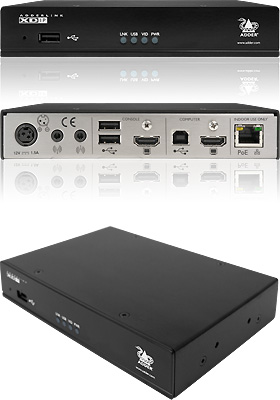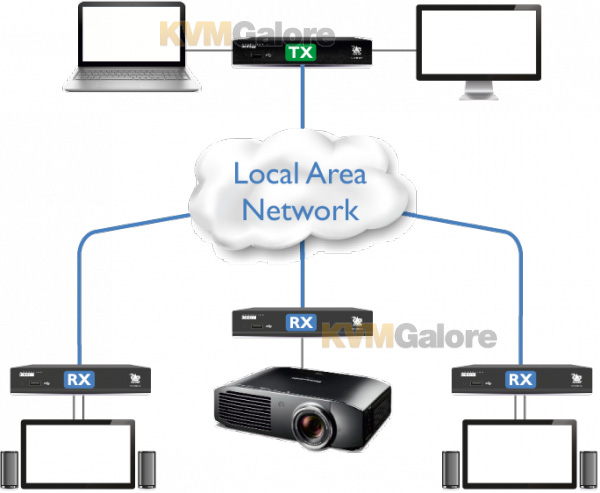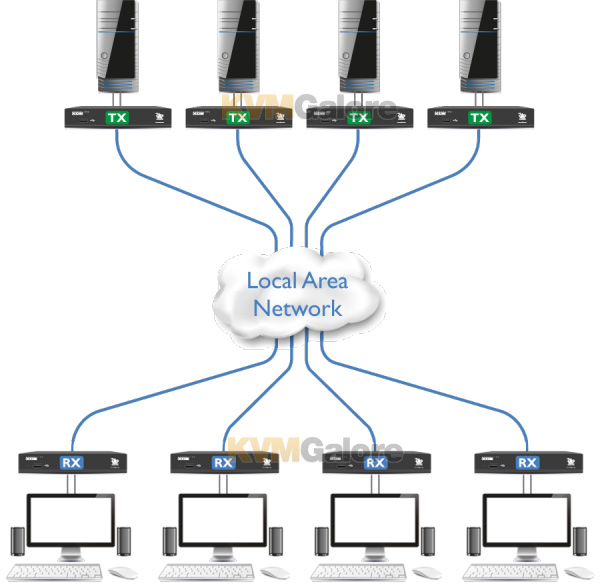Copyright © 2025 KVMGalore® - All rights reserved.

XDIP-RED: IP-based HDMI, USB and audio extender, switch or matrix
fanless and small form factor with PoE support and a RED PSU dongle
Note: At least two units - one configurred as a transmitter and the other configurred as a receiver - are required to setup an XDIP system
• Uses IP technology over standard CATx network cable
• Point-to-point, switching, sharing or small matrix configurations available
• Local USB and video feed-through ports
• USB 2.0 (low & full speed) for keyboard, mouse, tablet and touch screen
• Analog audio with headphone support
AdderLink XDIP is a compact, easy to install, fanless matrix solution that runs on a standard IP network and enables users to extend and manage their computers with ultra-low latency, HD video and stereo audio. XDIP is scalable, from simple extension to small matrix. It is very well suited to small and medium sized installations.
At their simplest, AdderLink XDIPs are high resolution, low latency digital KVM extenders which will operate just as easily across a direct 330 foot (100 m) CATx connection as they will across your standard 1GbE local network. However, there's much more to them than that.
- Many hosts, one console: XDIPs can form what might be termed a distributed KVM switch, where you authorize a single XDIP receiver to access up to 16 separate XDIP transmitters and their connected PC host systems.
- Multiple consoles, one host: Alternatively, a different grouping of XDIPs can form a KVM sharer (aka KVM splitter or reverse KVM) to allow up to 256 receivers to access and control the resources of a single PC host system.
 Transmitter or receiver? Your call
Transmitter or receiver? Your call
XDIP user (Receiver) and computer (Transmitter) units are identical and can be assigned a role at set up. This means the solution can be built to suit the application, and should the application change, units can be re-configured to suit.
Every XDIP node arrives in Start of Life (SoL) mode: it's up to you to choose whether it becomes a Transmitter or a Receiver. This ensures that your small stock of nodes can efficiently meet your current requirements - and then be easily redistributed, in any order, to satisfy future issues too.
Easy configuration
To streamline the initial installation procedure, AdderLink XDIP nodes use a configuration wizard to guide you through the necessary stages. AdderLink XDIP configuration is primarily driven via the receiver(s). During the initial configuration and subsequent post-installation alterations, a transmitter can be configured via a receiver.
Outstanding user experience
• Full-HD resolution
• Visually perfect video
• Low latency
• CD-quality stereo audio
• Graphical menus with color-coded layouts
• Near instant switching via...
- Hotkeys
- Mouse buttons
- On-screen display (OSD) menue
- Touchscreen
All HD video welcome
HDMI is the native video port on each node, however, using suitable third party converters/adapters you can connect DVI, dual-mode DisplayPort (DP++) or VGA signals at either end of the links.
Power over Ethernet (PoE)
Compatible with most PoE switches, XDIP can be easily installed without the need for additional power. Many PoE switches offer redundant power options which XDIP can leverage for enhanced reliability.
Feed through for flexibility
Every XDIP node features a feed-through port. This allows you to add a local console that can access both nearby and distant resources. When the local console is placed on an XDIP receiver, it will operate as its own KVM switch. Alternatively, when the local console is attached to an XDIP transmitter, it will also act as a video splitter. A combined application of the feed-through and KVM sharer features could be used, for instance, to serve a lecture theater.
AdderLink XDIP nodes are contained within slimline metal casings measuring just 6.65 x 4.4 x 1.2 in. (169 x 112 x 31mm).
 High quality video, real time control
High quality video, real time control
XDIP implements low latency, high quality, 60Hz video compression up to 1920x1200 to deliver an "at the computer" user experience over a standard Gigabit LAN. XDIP also supports stereo analog audio and USB 2.0 over a single CATx network cable.
Remote control
Users can remotely control their XDIP network via a RESTful API or HTTPS web browser. By managing the receiver end points through an API, users can control the matrix. The XDIP is designed to work with any third party controller via HTTPS.
CATx cable for connection
Video, USB 2.0 and audio all pass along a single minimum spec of CAT-5e cable allowing use of existing infrastructure cables in the building and an immediate ROI. Distance is linked to the IP standard of 330 feet (100 m) with a 40% overhead for safety. Longer distances are achieved by routing through your IP infrastructure.
Feed through and local computer support
Video and USB feed through ports are available. These enable a local console at the source computer. A local computer is also supported at the user station.
Flexible and scalable
Each XDIP unit can be configured as a simple extender, distributed KVM switch or for AV distribution. Each receiver can see up to 16 sources and each transmitter can connect to up to 256 receivers.
EDID management
The extender has intelligent EDID management to allow the true characteristics of the monitor to be passed back to the computer or alternatively, a fixed EDID can be specified.
Plug and Play
There is no need for drivers or software to be installed. A simple wizard takes you through setup at the start of life of the product.
CD-quality analog audio
CD-quality stereo audio (16-bit sampling at 48kHz) is passed between the local and remote units. Headphones are also supported (16 to 32 Ohms).
In the box
1x AdderLink XDIP PoE node
1x VSC48 dongle (connecting to RED PSU)
1x HDMI cable with locking connectors, 4.9 feet (1.5m)
1x USB (Type-A to Type-B) cable, 6.5 feet (2m)
1x Audio (3.5mm stereo jacks) cable, 9.8 feet (3m)
8x Self-adhesive rubber feet
Need help with product selection?
Call KVMGalore at 1-800-636-3434, or submit your question on KVMGalore HelpCenter.



















